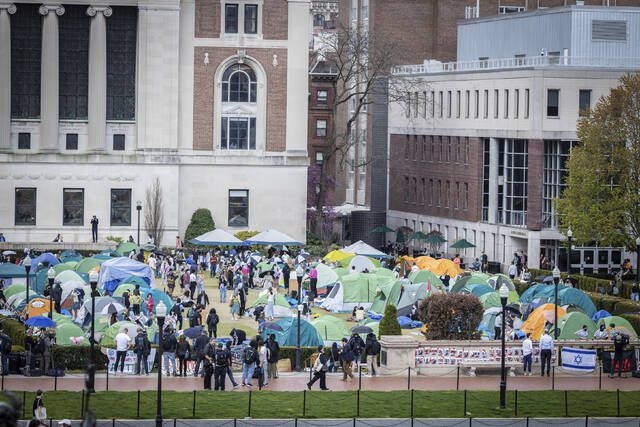AUSTIN, Texas — Police clashed with student protesters in Texas and California while new camps appeared Wednesday at Harvard and other colleges as school administrators looked for ways to calm a growing wave of pro-Palestinian protests.
At the University of Texas at Austin, hundreds of local and state police — including some on horseback and using batons — clashed with protesters, pushing them off the campus lawn and at one point sending some tumbling into the street. At least 20 demonstrators were taken into custody at the request of university officials and Texas Gov. Greg Abbott, according to the state Department of Public Safety.
A photographer covering the protest for Fox 7 Austin was arrested after being caught in a push-and-pull between law enforcement and students, the station confirmed. A long-standing Texas journalist was knocked down in the chaos and could be seen bleeding before police assisted him to emergency medical staff who bandaged his head.
And at the University of Southern California, police engaged in a back-and-forth tugging match with protesters over tents, removing several before retreating. At the northern end of California, students were barricaded inside a building for a third day at California State Polytechnic University, Humboldt. The school shut down campus through the weekend and made classes virtual.
Harvard University in Massachusetts had tried to stay ahead of protests this week by limiting access to Harvard Yard and requiring permission for tents and tables. That didn’t stop protesters from setting up a camp with 14 tents Wednesday following a rally against the university’s suspension of the Harvard Undergraduate Palestine Solidarity Committee.
Students protesting the Israel-Hamas war are demanding schools cut financial ties to Israel and divest from companies enabling its months-long conflict. Dozens have been arrested on charges of trespassing or disorderly conduct. Some Jewish students say the protests have turned into antisemitism and made them afraid to set foot on campus.
Columbia University avoided another clash between students and police earlier in the day. The situation there remained tense, with campus officials saying it would continue talks with protesters for another 48 hours.
During a visit to campus, U.S. House Speaker Mike Johnson, a Republican, called on Columbia University President Minouche Shafik to resign “if she cannot bring order to this chaos.”
“If this is not contained quickly and if these threats and intimidation are not stopped, there is an appropriate time for the National Guard,” he said.
Shafik had set a midnight Tuesday deadline to reach an agreement on clearing an encampment, but the school extended negotiations, saying it was making “important progress.”
On Wednesday evening, a Columbia spokesperson said rumors that the university had threatened to bring in the National Guard were unfounded. “Our focus is to restore order, and if we can get there through dialogue, we will,” said Ben Chang, Columbia’s vice president for communications.
Omer Lubaton Granot, a Columbia graduate student, posted pictures of Israeli hostages near the encampment to remind people that over 100 hostages are still held by Hamas.
He mentioned that while many people advocate for human rights, they have not addressed the issue of young individuals being kidnapped from their homes or a music festival in Israel and held by a terror organization.
Tala Alfoqaha, a Palestinian Harvard law student, expressed that she and other protesters are seeking more openness from the university.
She expressed her desire for the Harvard administration to heed the students' calls for divestment, transparency, and the dropping of charges against students.
Last week, the police attempted to remove the encampment at Columbia, resulting in the arrest of over 100 protesters. This action backfired, inspiring students nationwide to create similar encampments and encouraging Columbia protesters to regroup.
Approximately 60 tents remained at the calm Columbia encampment on Wednesday, with tight security measures and the requirement for identification and the setup of metal barricades by the police.
Columbia announced an agreement with protest representatives that only students would stay at the encampment, and it would be inclusive, prohibiting discriminatory or harassing language.



